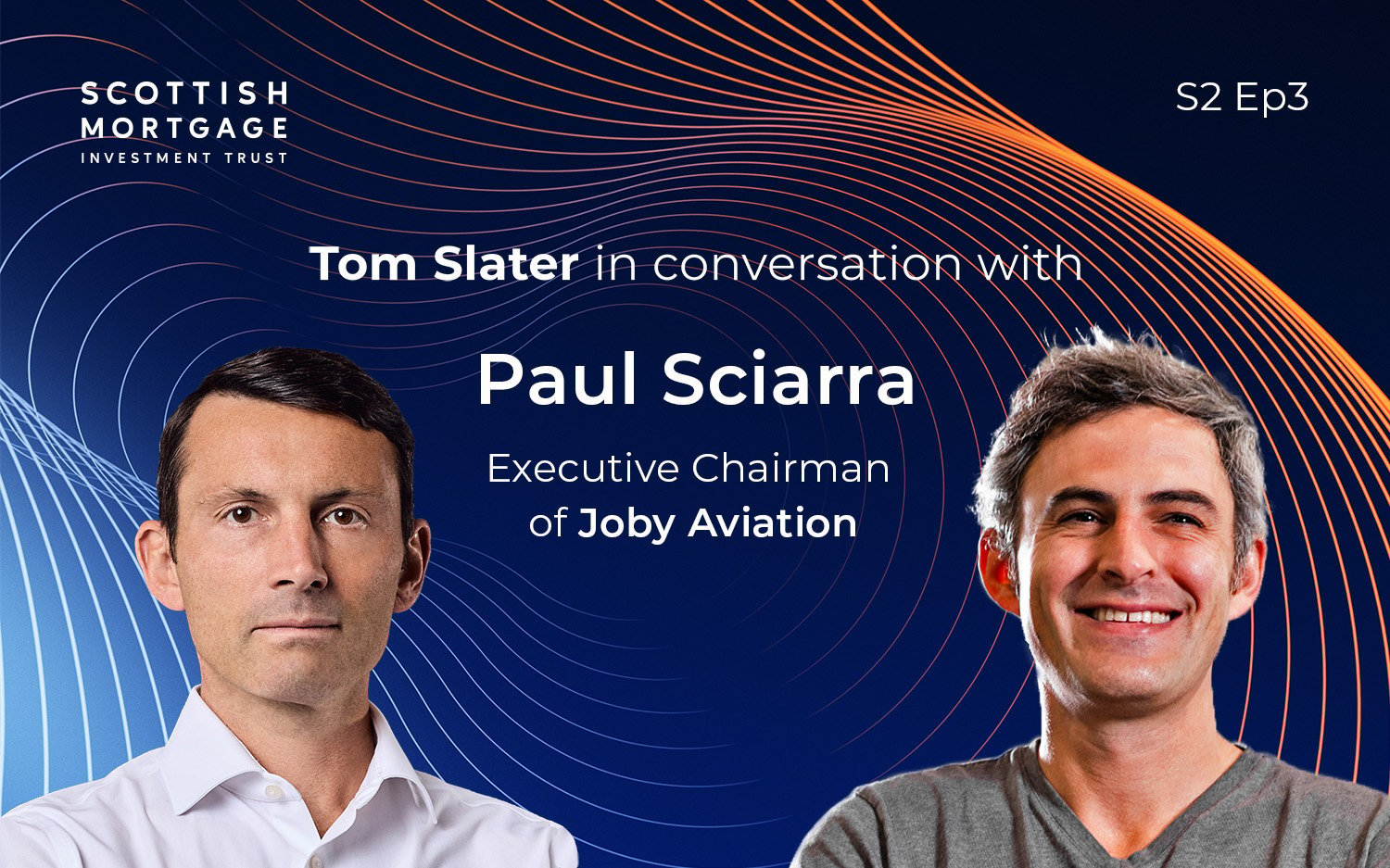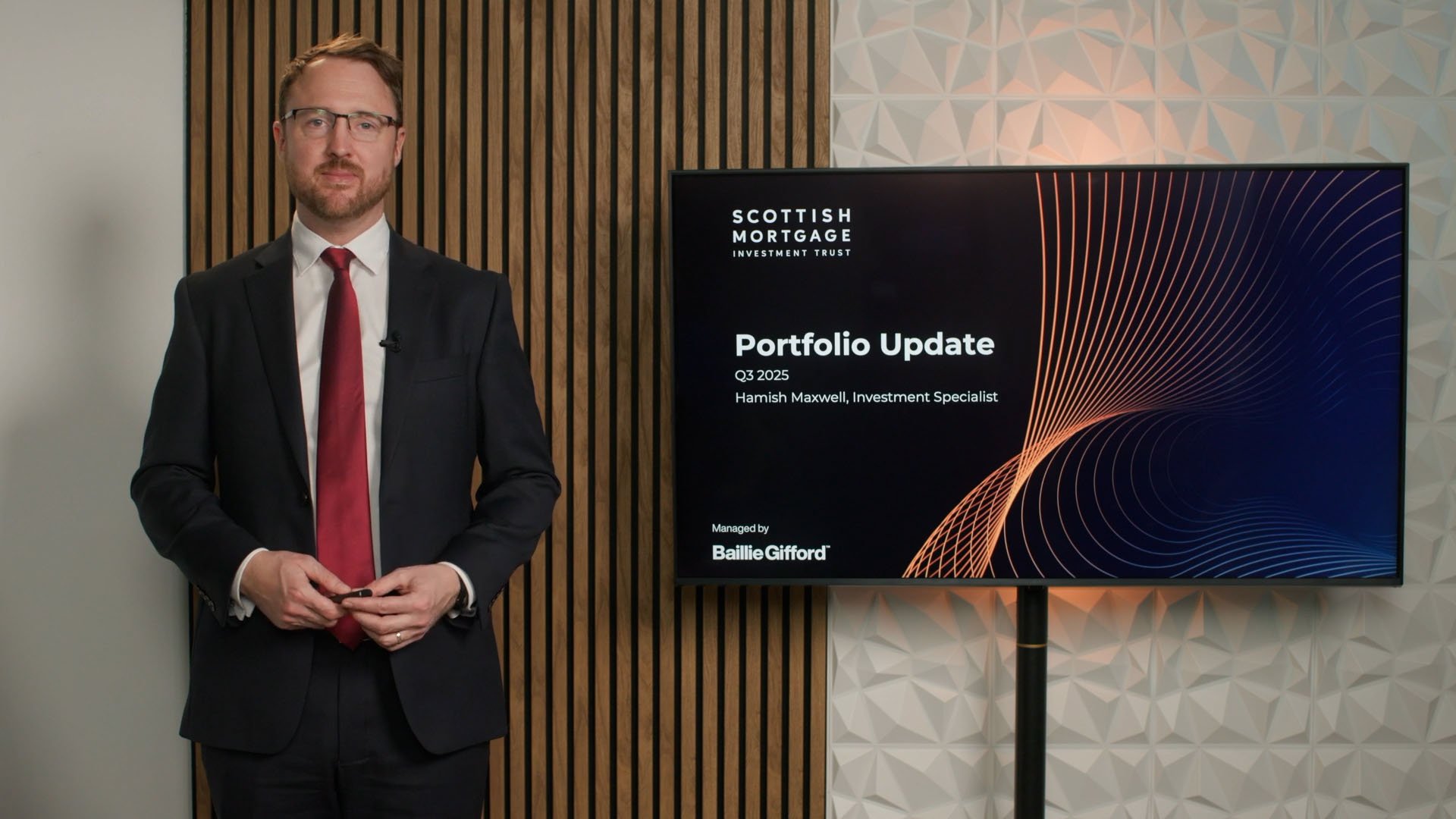Joby Aviation Readies for Take-Off
Tom Slater
Key Points
- Joby Aviation’s electric vertical take-off and landing (eVTOL) ‘flying taxis’ are soon to enter service in Dubai
- Scottish Mortgage manager Tom Slater explains how the Californian company is tackling multiple engineering and regulatory challenges
- Joby’s mastery of engineering, software, manufacturing process and aviation law inspires confidence

As with any investment, your capital is at risk.
JoeBen Bevirt grew up in a remote Californian hippie commune called Last Chance in the mountains behind Santa Cruz. Every day the school bus dropped him four miles from home, leaving him to trudge from the Pacific Highway up “an endless hill that made me dream of a better way to get around”.
Many others now share his dream, thanks to Joby Aviation, the flying taxi company he founded in 2009.
Now it envisages “saving a billion people an hour per day” by filling the skies with quick, clean, quiet and safe electric vertical take-off and landing aircraft (eVTOLs, pronounced ee-veetols). Flying without fossil fuel, they can travel 100 miles at up to 200mph.
Joby’s progress in capital raising, aeronautical design, software, manufacturing and assembly, plus its stamina for the grind of regulatory approval, puts Bevirt’s vision within reach. With it comes the possibility of transforming how and where we live.
The eVTOL Revolution
EVTOLs promise to cut congestion, reduce emissions and slash journey times. But as with electric cars, the just-about-to-happen period can be prolonged.
Dubai could be the tipping point. Last November, Bevirt and the city-state’s Crown Prince broke ground at Dubai International Airport on the first of four ‘vertiports’ for Joby’s four-passenger eVTOLs, known as S4s. The first paying passenger flights are slated for later this year.
On a good day, a bumper-to-bumper car journey from the airport to the luxury island of Palm Jumeirah takes 45 minutes. Joby is aiming for 12. Other vertiports will be built at Dubai’s Marina and the Downtown shopping area.

Speeding novelty-loving Gulf-dwellers and tourists to the shops may not have featured in Bevirt’s plans when he founded Joby 16 years ago, but Dubai is a chance to prove his firm’s technology and business model.
The firm has also announced a tie-up with Virgin Atlantic to operate short-haul flights in the UK if they’re approved by regulators. The deal holds out the promise of eight-minute zips from Heathrow to Canary Wharf and hopping from Manchester Airport to Leeds in 15 minutes.
As a pre-revenue company, the sooner it generates income, the more control it has over its fate.
Back in the US, Joby awaits approval from the Federal Aviation Administration (FAA). Last autumn the regulator published its long-awaited rulebook for eVTOLs, the first new aircraft category since the helicopter in the 1940s.
Once it gives the green light, Joby can launch the first of its sky taxi services from Los Angeles Airport to downtown LA and from JFK Airport to Manhattan. The latter journey takes 50 minutes by car, seven minutes by Joby.
Desert Home
Joby HQ is a dusty aerodrome at Marina, California, near where Bevirt grew up. This is far off the beaten track for tech investors, who tend to cluster around the San Francisco Bay area.
Colleagues who have visited report on the close camaraderie and a high-fiving, hard-driving culture set by the charismatic founder as he strives to get eVTOLs airborne.
The site houses the firm’s first production line, which Joby built with the help of its manufacturing partner Toyota. It’s a pilot for a planned facility at Dayton, Ohio, where Joby intends to turn out 500 of its S4s with a $500m investment from the Japanese giant.
Scottish Mortgage’s work on electric cars helped us understand Joby’s potential to reduce carbon emissions in the highly polluting aviation sector. And it was Tesla’s former chief financial officer, Deepak Ahuja, who introduced us to Bevirt and his executive chairman, Paul Sciarra.
Sciarra is the ideal foil for Bevirt’s engineering genius and critical to Joby’s blend of traditional aeronautical engineering skills and software startup mindset.
As a successful founder in his own right, Sciarra brings operational and management focus to the company. The pair have assembled a leadership team that knows how to operate at scale, can develop training and safety programmes, and is able to ramp up manufacturing.

Executive Chairman of Joby, Paul Sciarra, on how its electric vertical take-off and landing (eVOTL) aircrafts are well-placed to revolutionise how people travel in modern cities, on our podcast Invest in Progress.
Listen to the podcast here.
What’s Changed?
As with electric cars, the swing factor for eVTOLs has been batteries becoming lighter, cheaper and more powerful. The S4s distribute the batteries’ power between six propellers.
This removes the need for a heavy central engine and allows the vehicles to keep flying safely if a propeller fails.
Another crucial unlocking factor is noise. Skilful engineering means that a Joby aircraft in flight sounds more like rushing wind than the whump-whump of a helicopter or the whine of a drone.
And without the dangers posed by giant swirling blades just above head height, urban operation becomes feasible.
However, the biggest innovation may not be design or aviation software – a safety-critical field where novelty is unwelcome. Rather, it could be the company’s ‘vertically integrated’ business model: in the footsteps of Tesla and SpaceX, Joby wants to be Boeing-plus-British Airways, so to speak.
Using its proprietary ElevateOS software to help pilots navigate and passengers book, the firm intends to earn revenue from four sources: a rideshare taxi service, selling aircraft to third parties, government contracts and maintenance services.

The scale of this ambition appeals to Scottish Mortgage. In our experience, you need vertical integration to move fast.
Many founder-leaders have taught us that when it comes to new kinds of hardware, controlling every part of the process makes you nimbler than the incumbents and their traditional supply chains.
We’re also impressed by Joby’s early focus on a cost-effective and time-efficient manufacturing process. It’s setting out to create ‘a machine to make machines’ at Dayton.
Not just: how do we get the FAA’s go-ahead? More: how do we get approval for a set of processes that will quickly let us do this at a greater scale?
Productive Partnerships
This ambition is manifest in the quality of talent the company hires and how it approaches the multiple tasks at hand.
We also like the way it engages with regulators and commercial partners, including:
- Toyota: Renowned for efficient, high-quality manufacturing, the carmaker has invested $900m in total. The partnership helps validate Joby’s ability to make highly complex aircraft and parts precisely and reliably.
- Delta Air Lines: The US’s second-biggest airline is working with Joby to help its passengers get to the airport, removing one of the biggest friction points of air travel and hinting at the scale of future opportunities. The collaboration encompasses the recent tie-up with Virgin Atlantic, in which Delta has a 49 per cent stake.
- US Air Force: Joby has supplied two non-combat aircraft for logistics, personnel transportation and medical evacuation, with two more on order. The military test process is separate from the FAA’s, though the flying hours it racks up will help achieve civil certification.
Operational excellence and strategic tie-ups are just two of many things Joby needs to get right. But perhaps even more important is its financial planning. Joby has funding partners who understand that they’re there for the long run. It has prioritised a robust balance sheet and not worried about diluting the founders’ shares.
For longer commutes, the S4 could also be the eco-friendly option. An independent study compared the greenhouse gas emissions of a fully loaded eVTOL and an electric car with a typical occupancy of 1.5 passengers. It found the aircraft produced fewer emissions per passenger mile when journeys exceeded 62 miles.
That eVTOL edge could increase if hydrogen power is combined with battery power. Bevirt is now applying his creative energy to the company’s next stage, developing Joby’s potentially more energy-efficient hydrogen-electric SHy4 demonstrator model. It completed a 523-mile test last November, with water as the only by-product.
Ultimately, Scottish Mortgage’s investment in Joby rests on the prospect of shareholders benefiting from returns from the transportation revolution it could bring about. With a successful eVTOL business, we would be talking about more than an incremental improvement to the gridlock and pollution blighting people’s lives.
That tallies with our core quest for businesses that can disrupt the world for the better.
About the author - Tom Slater
Tom has been the Manager of Scottish Mortgage since 2015, having been appointed as Deputy Manager in 2009. He joined Baillie Gifford in 2000 and became a Partner of the firm in 2012. Besides Scottish Mortgage, he is the Head of the US Equities Team and a member of another long-term growth equity strategy. During his time at Baillie Gifford, Tom has also worked in the Developed Asia and UK Equity teams. His investment interest is focused on high-growth companies both in listed equity markets and as an investor in private companies. He graduated with a BSc in Computer Science with Mathematics from the University of Edinburgh in 2000.
Regulatory Information
This content was produced and approved at the time stated and may not have been updated subsequently. It represents views held at the time of production and may not reflect current thinking. Read our Legal and regulatory information for further details.
A Key Information Document is available by visiting our Documents page. Any images used in this content are for illustrative purposes only.
This content does not constitute, and is not subject to the protections afforded to, independent research. Baillie Gifford and its staff may have dealt in the investments concerned. The views expressed are not statements of fact and should not be considered as advice or a recommendation to buy, sell or hold a particular investment.
Baillie Gifford & Co and Baillie Gifford & Co Limited are authorised and regulated by the Financial Conduct Authority (FCA). The investment trusts managed by Baillie Gifford & Co Limited are listed on the London Stock Exchange and are not authorised or regulated by the FCA.
Baillie Gifford Asia (Hong Kong) Limited 柏基亞洲(香港)有限公司 (BGA) holds a Type 1 licence from the Securities and Futures Commission of Hong Kong to market and distribute Baillie Gifford’s range of collective investment schemes and closed-ended funds such as investment trusts to professional investors in Hong Kong.
Baillie Gifford Asia (Singapore) Private Limited (BGAS) is regulated by the Monetary Authority of Singapore as a holder of a capital markets services licence to conduct fund management activities for institutional investors and accredited investors in Singapore. BGA and BGAS are wholly owned subsidiaries of Baillie Gifford Overseas Limited, which is wholly owned by Baillie Gifford & Co.
Europe
Scottish Mortgage Investment Trust PLC (the “Company”) is an alternative investment fund for the purpose of Directive 2011/61/EU (the “AIFM Directive”). Baillie Gifford & Co Limited is the alternative investment fund manager (“AIFM”) of the Company and has been authorised for marketing to Professional Investors in this jurisdiction.
This content is made available by Baillie Gifford Investment Management (Europe) Limited (“BGE”), which has been engaged by the AIFM to carry out promotional activities relating to the Company. BGE is authorised by the Central Bank of Ireland as an AIFM under the AIFM Regulations and as a UCITS management company under the UCITS Regulation. BGE also has regulatory permissions to perform promotional, advisory and Individual Portfolio Management activities. BGE has passported its authorisations under the mechanisms set out in the AIFM Directive.
Belgium
The Company has not been and will not be registered with the Belgian Financial Services and Markets Authority (Autoriteit voor Financiële Diensten en Markten / Autorité des services et marchés financiers) (the FSMA) as a public foreign alternative collective investment scheme under Article 259 of the Belgian Law of 19 April 2014 on alternative collective investment institutions and their managers (the Law of 19 April 2014). The shares in the Company will be marketed in Belgium to professional investors within the meaning the Law of 19 April 2014 only. Any offering material relating to the offering has not been, and will not be, approved by the FSMA pursuant to the Belgian laws and regulations applicable to the public offering of securities. Accordingly, this offering as well as any documents and materials relating to the offering may not be advertised, offered or distributed in any other way, directly or indirectly, to any other person located and/or resident in Belgium other than to professional investors within the meaning the Law of 19 April 2014 and in circumstances which do not constitute an offer to the public pursuant to the Law of 19 April 2014. The shares offered by the Company shall not, whether directly or indirectly, be marketed, offered, sold, transferred or delivered in Belgium to any individual or legal entity other than to professional investors within the meaning the Law of 19 April 2014 or than to investors having a minimum investment of at least EUR 250,000 per investor.
Germany
The Trust has not offered or placed and will not offer or place or sell, directly or indirectly, units/shares to retail investors or semi-professional investors in Germany, i.e. investors which do not qualify as professional investors as defined in sec. 1 (19) no. 32 German Investment Code (Kapitalanlagegesetzbuch – KAGB) and has not distributed and will not distribute or cause to be distributed to such retail or semi-professional investor in Germany, this document or any other offering material relating to the units/shares of the Trust and that such offers, placements, sales and distributions have been and will be made in Germany only to professional investors within the meaning of sec. 1 (19) no. 32 German Investment Code (Kapitalanlagegesetzbuch – KAGB).
Luxembourg
Units/shares/interests of the Trust may only be offered or sold in the Grand Duchy of Luxembourg (Luxembourg) to professional investors within the meaning of Luxembourg act by the act of 12 July 2013 on alternative investment fund managers (the AIFM Act). This document does not constitute an offer, an invitation or a solicitation for any investment or subscription for the units/shares/interests of the Trust by retail investors in Luxembourg. Any person who is in possession of this document is hereby notified that no action has or will be taken that would allow a direct or indirect offering or placement of the units/shares/interests of the Trust to retail investors in Luxembourg.
Switzerland
The Trust has not been approved by the Swiss Financial Market Supervisory Authority (“FINMA”) for offering to non-qualified investors pursuant to Art. 120 para. 1 of the Swiss Federal Act on Collective Investment Schemes of 23 June 2006, as amended (“CISA”). Accordingly, the interests in the Trust may only be offered or advertised, and this document may only be made available, in Switzerland to qualified investors within the meaning of CISA. Investors in the Trust do not benefit from the specific investor protection provided by CISA and the supervision by the FINMA in connection with the approval for offering.
Singapore
This content has not been registered as a prospectus with the Monetary Authority of Singapore. Accordingly, this content and any other content or material in connection with the offer or sale, or invitation for subscription or purchase, of the Trust may not be circulated or distributed, nor may be offered or sold, or be made the subject of an invitation for subscription or purchase, whether directly or indirectly, to persons in Singapore other than (i) to an institutional investor (as defined in Section 4A of the Securities and Futures Act 2001, as modified or amended from time to time (SFA)) pursuant to Section 274 of the SFA, (ii) to a relevant person (as defined in Section 275(2) of the SFA) pursuant to Section 275(1), or any person pursuant to Section 275(1A), and in accordance with the conditions specified in Section 275 of the SFA, or (iii) otherwise pursuant to, and in accordance with the conditions of, any other applicable provision of the SFA.
Where the Trust is subscribed or purchased under Section 275 by a relevant person which is:
(a) a corporation (which is not an accredited investor (as defined in Section 4A of the SFA)) the sole business of which is to hold investments and the entire share capital of which is owned by one or more individuals, each of whom is an accredited investor; or
(b) a trust (where the trustee is not an accredited investor) whose sole purpose is to hold investments and each beneficiary of the trust is an individual who is an accredited investor, securities or securities-based derivatives contracts (each term as defined in Section 2(1) of the SFA) of that corporation or the beneficiaries’ rights and interest (howsoever described) in that trust shall not be transferred within six months after that corporation or that trust has acquired the securities pursuant to an offer made under Section 275 except:
(1) to an institutional investor or to a relevant person or to any person arising from an offer referred to in Section 275(1A) or Section 276(4)(c)(ii) of the SFA,
(2) where no consideration is or will be given for the transfer;
(3) where the transfer is by operation of law; or
(4) pursuant to Section 276(7) of the SFA or Regulation 37A of the Securities and Futures (Offers of Investments) (Securities and Securities-based Derivatives Contracts) Regulations 2018.





